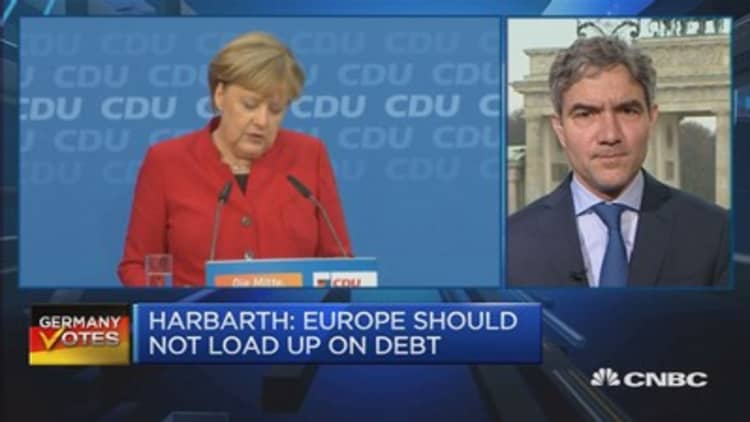Angela Merkel's decision to run for a fourth term as German chancellor coincided with the release of a poll showing that 55 percent of the electorate support this decision, with stability seen as the key attribute the long-standing leader would bring to a renewed stint in office.
Proponents of the existing liberal order in Europe are looking to Merkel's experience and perceived strength as a crucial ballast in the face of the rising tide of populism sweeping Western democracies and seen as posing a challenge to long-standing political structures and certain values underpinning them.
According to Josef Janning, senior policy fellow and head of the European Council on Foreign Relations' Berlin office, "A fourth Merkel term will signal continuity above everything else."
"In fact, Merkel will become even more active internationally - all German chancellors have followed that pattern in the later years of their time in office," he explained in emailed comments to CNBC.
Yet the outcome of a pair of upcoming votes will be critical in determining how much support she has from other core European Union (EU) leaders. Italy is set to decide on December 4 whether to back its incumbent Prime Minister Matteo Renzi, who in seeking power to make constitutional reforms has staked his leadership on a referendum. If Renzi is compelled to step aside, the door opens more widely for the anti-establishment Five Star Movement to potentially assume power at the next election.
Meanwhile in France, pollsters expect next May's presidential election to come down to a run-off between the center-right's Francois Fillon and Marine Le Pen for France's far-right National Front.
According to Stephen Szabo, executive director of the Transatlantic Academy, these outcomes are crucial for Merkel.
"The prospect of a Fillon presidency clearly is welcome in Berlin. If Le Pen loses and Renzi survives, Merkel will have a chance to shape European responses to Brexit, the refugee situation, the problems with the euro and Russia," he said via emailed comments to CNBC.
Merkel a ‘force of inertia’
However, a win for Le Pen would add to Merkel's headaches,with the National Front leader declaring she would call referendums on withdrawing France from both the euro monetary union and the EU itself.
Speaking to CNBC on Monday, Marine Le Pen, claimed that Merkel is a "force of inertia".
"I think that the days of the ideology supported by Mrs Merkel are numbered," Marine Le Pen added.
Holger Schmieding, chief economist at Berenberg, told CNBC via email that he would also expect Merkel to continue with her existing policies, saying "she will ask other countries in Europe to reform without really backing sanctions on those who don't."
"She will manage Brexit in a way that prioritizes the coherence of the EU27 (the other member states) even if that means that the U.K. gets a raw deal," he added.
According to Janning, the German chancellor would need to make more of an effort to lead a group of like-minded countries within Europe "from the center".
"If Merkel does not reverse the trend of Germany going it alone, Europe will have a problem: A Germany that is not willing and able to lead alone in a Europe that does not want to be led by one country."
Domestic priorities

Within Germany itself, Merkel will have to manage the burgeoning growth of the right-wing Alternative for Germany (AfD) party into a credible political force.
Speaking to CNBC, Werner Patzelt, a political scientist at the Technical University of Dresden, said given her behavior in the euro crisis she only had herself to blame for its rise.
According to Patzelt, "AfD is a German expression of that kind of right-wing populism that you see everywhere in Europe."
"One of the failures of Angela Merkel is she has underestimated AfD …and now needs to live with the consequences," he warned.
Yet according to Schmieding, given Germany's strong economic position and full employment, agitation for change is far less ubiquitous there than in other Western countries.
Janning nonetheless warns, "Her fourth term will be one of party conflicts. She has not prepared her succession and is not likely to do so before 2018. So, it will be done without her, and, in part, against her."
Trump and Putin
With the world still waiting to see what a Donald Trump presidency will mean for global politics and the global economy, the lack of enthusiasm for the Republican President-elect within Germany signals Merkel will need to proceed with caution.
According to Szabo, "Merkel will have to walk a tight rope on her relationship to Trump ... Trump is deeply unpopular in Germany."
Merkel's pragmatism is expected to guide the working relationship between her and the next U.S. president, with her acknowledging in recent days that the transatlantic trade agreement she had worked so hard to implement alongside current U.S. President Barack Obama, was moribund under Trump.
Turning to Russia, Chris Weafer, founding partner at Macro-Advisory, says a continuation of the "critical pragmatism" employed by Merkel over the past 18 to 24 months will be necessary to conduct her relationship with President Vladimir Putin which has now become "strained beyond repair".
In emailed comments to CNBC, Weafer posited, "I would expect more of the same through Merkel and Putin's next terms; regular and tough criticism by both which is not allowed get in the way of business."


